Queer studies, sexual diversity studies, or LGBTQ studies is the study of topics relating to sexual orientation and gender identity usually focusing on lesbian, gay, bisexual, transgender, gender dysphoric, asexual, aromantic, queer, questioning, and intersex people and cultures.

Alex Sanchez is a Mexican American author of award-winning novels for teens and adults. His first novel, Rainbow Boys (2001), was selected by the American Library Association (ALA), as a Best Book for Young Adults. Subsequent books have won additional awards, including the Lambda Literary Award. Although Sanchez's novels are widely accepted in thousands of school and public libraries in America, they have faced a handful of challenges and efforts to ban them. In Webster, New York, removal of Rainbow Boys from the 2006 summer reading list was met by a counter-protest from students, parents, librarians, and community members resulting in the book being placed on the 2007 summer reading list.

Heather Has Two Mommies is a children's book written by Lesléa Newman with illustrations by Diana Souza. First published in 1989, it was one of the first pieces of LGBTQ+ children's literature to garner broad attention.
Proposed bans of LGBTQ-themed books in the United States.

Gay literature is a collective term for literature produced by or for the gay community which involves characters, plot lines, and/or themes portraying male homosexual behavior.

The Sissy Duckling is a children's picture book written by actor Harvey Fierstein and illustrated by Henry Cole. It is 40 pages long and intended for children ages 5–8.

Daddy's Roommate is a children's book written by Michael Willhoite and published by Alyson Books in 1990. One of the first children's books to address the subject of homosexuality, the story follows a young boy whose divorced father now lives with his life partner. The book's depiction of a gay household has led to its inclusion in many educational programs, and Willhoite's work was awarded a Lambda Literary Award in 1991.
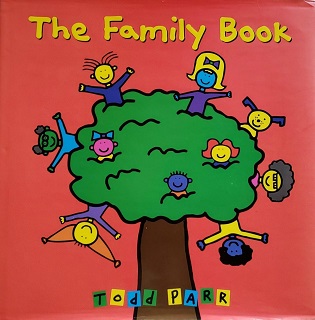
The Family Book is a 2003 children's picture book written and illustrated by Todd Parr that details the daily lives of all kinds of families. Each unique family structure is depicted with vivid illustrations that complement the book’s themes of family diversity and inclusivity. The book has been adopted in various educational settings as a teaching tool to normalize the acceptance of various family forms. The Family Book has been challenged repeatedly and has sparked controversy in certain regions due to its inclusion of same-sex marriages as a family structure in the book.

And Tango Makes Three is a children's book written by Peter Parnell and Justin Richardson and illustrated by Henry Cole which was published in 2005. The book tells the story of two male penguins, Roy and Silo, who create a family together. With the help of the zookeeper, Mr. Gramsay, Roy and Silo are given an egg which they help hatch. The female chick, that completes their family, is consequently named "Tango" by the zookeepers. The book was based on the true story of Roy and Silo, two male chinstrap penguins who formed a pair bond in New York's Central Park Zoo.

A same-sex relationship is a romantic or sexual relationship between people of the same sex. Same-sex marriage refers to the institutionalized recognition of such relationships in the form of a marriage; civil unions may exist in countries where same-sex marriage does not.

It's Perfectly Normal: Changing Bodies, Growing Up, Sex, and Sexual Health is a children's book written by Robie Harris and illustrated by Michael Emberley. The purpose of the book is to inform preadolescent children about puberty by exploring different definitions of sex. It was first published in 1994 by Candlewick Press and has since been updated several times with new information. It's also been published under the title Let's Talk About Sex in the UK. Harris was prompted to write It's Perfectly Normal by her editor so young individuals would understand aspects of sexual health. The book has won multiple accolades and appraisal for its accurate information and its normalization of body changes and human sexuality. However, it has also been a source of controversy because of its graphic images that some consider inappropriate for the targeted age range. Many of Harris' books, including It's Perfectly Normal, have appeared on the American Library Association's Most Challenged Books list frequently since 2005. It's Perfectly Normal has additional anniversary editions that were published in 2004, 2009, and 2014. The book has also been translated in 27 languages.
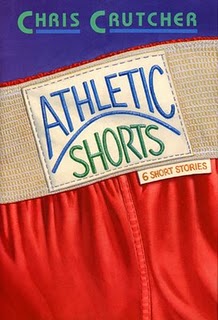
Athletic Shorts: Six Short Stories is a young adult fiction short story collection by Chris Crutcher. Most of the stories are related to Crutcher's early work and often come from his experience as a family counselor. This book also contains the short story "A Brief Moment in the Life of Angus Bethune" which first appeared in Connections, edited by Donald R. Gallo, published in 1989 by Delacorte Press. It was adapted into the film Angus. The novel has been met with challenges from school districts due to the book's inclusion of offensive language, homosexuality, and sexual content, and was the fourth most challenged book in 2006.
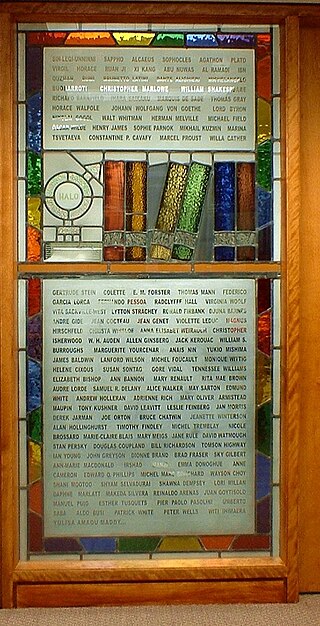
In the post-Stonewall era, the role of libraries in providing information and services to LGBTQ individuals has been a topic of discussion among library professionals. Libraries can often play an important role for LGBTQ individuals looking to find information about coming out, health, and family topics, as well as leisure reading. In the past 50 years, advocate organizations for LGBTQ content in libraries have emerged, and numerous theorists have discussed various aspects of LGBTQ library service including privacy concerns, programming, collection development considerations and librarian/staff education needs, as well as special services for juvenile and teen patrons.
LGBT writers in the Dutch-language area are writers from de Lage Landen, that is Flanders and the Netherlands,
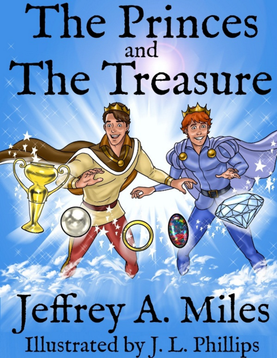
The Princes and the Treasure is a children's picture book and fairy tale by Jeffrey A. Miles, featuring illustrations by J. L. Phillips. The book was first published in the United States on February 9, 2014, through Handsome Prince Publishing, and has been translated into 26 languages and is available in over 137 countries. The story follows two men tasked with saving a princess, only to discover their love for one another.
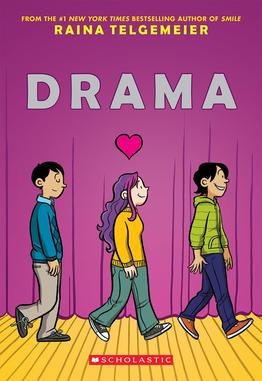
Drama is a graphic novel written by American cartoonist Raina Telgemeier which centers on the story of Callie, a middle school student and theater-lover who works in her school's drama production crew. While navigating seventh grade, Callie deals with tween hardship, including confusing crushes, budding friendships, and middle school drama. It is a coming-of-age story that explores themes of friendship, teamwork, inclusion, and determination through Callie and her relationship with the people around her.

Prince & Knight is a children's picture book authored by Daniel Haack and illustrated by Stevie Lewis. Prince & Knight tells the story of a young prince who falls in love with a knight after the two work together to battle a dragon threatening the kingdom. At the conclusion of the book, the two wed.

Maiden & Princess is a 2019 picture book written in rhyming verse by Daniel Haack and Isabel Galupo and illustrated by Becca Human. The story, described in some press outlets as a lesbian fairy tale, concerns a maiden attending a ball centered on finding a wife for the prince; at the ball, the maiden instead falls in love with his sister, the princess.
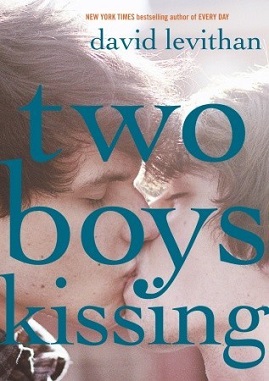
Two Boys Kissing is a 2013 young adult novel written by American author David Levithan. Inspired by true events, the book follows two 17-year-old boys who set out to break a Guinness World Record by kissing for 32 hours. The book includes a "Greek chorus" of the generation of gay men who died of AIDS. Throughout the narrative, the book discusses topics such as relationships, coming out, gender identity, and hook-up culture.
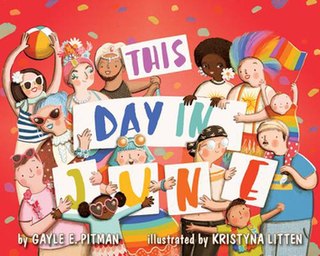
This Day in June is a picture book written by Gayle E. Pitman, illustrated by Kristyna Litten, and published May 5, 2014 by Magination Press. The book follows a family as they attend a pride parade.


















